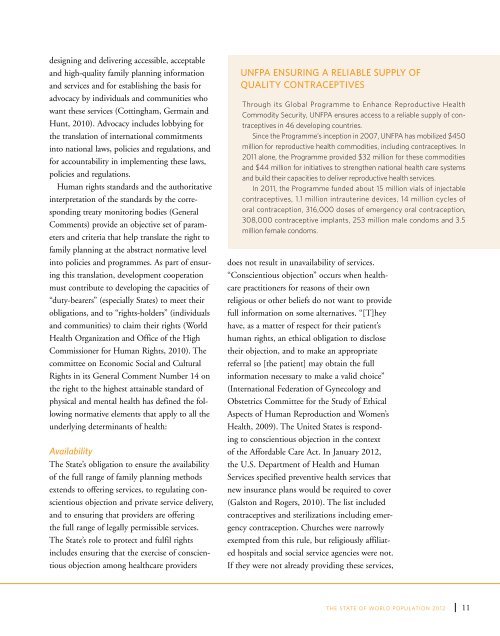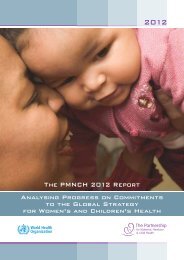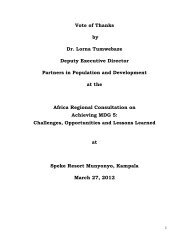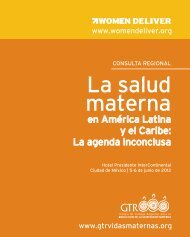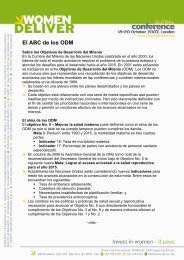State of World Population 2012 - UNFPA Haiti
State of World Population 2012 - UNFPA Haiti
State of World Population 2012 - UNFPA Haiti
You also want an ePaper? Increase the reach of your titles
YUMPU automatically turns print PDFs into web optimized ePapers that Google loves.
designing and delivering accessible, acceptableand high-quality family planning informationand services and for establishing the basis foradvocacy by individuals and communities whowant these services (Cottingham, Germain andHunt, 2010). Advocacy includes lobbying forthe translation <strong>of</strong> international commitmentsinto national laws, policies and regulations, andfor accountability in implementing these laws,policies and regulations.Human rights standards and the authoritativeinterpretation <strong>of</strong> the standards by the correspondingtreaty monitoring bodies (GeneralComments) provide an objective set <strong>of</strong> parametersand criteria that help translate the right t<strong>of</strong>amily planning at the abstract normative levelinto policies and programmes. As part <strong>of</strong> ensuringthis translation, development cooperationmust contribute to developing the capacities <strong>of</strong>“duty-bearers” (especially <strong>State</strong>s) to meet theirobligations, and to “rights-holders” (individualsand communities) to claim their rights (<strong>World</strong>Health Organization and Office <strong>of</strong> the HighCommissioner for Human Rights, 2010). Thecommittee on Economic Social and CulturalRights in its General Comment Number 14 onthe right to the highest attainable standard <strong>of</strong>physical and mental health has defined the followingnormative elements that apply to all theunderlying determinants <strong>of</strong> health:AvailabilityThe <strong>State</strong>’s obligation to ensure the availability<strong>of</strong> the full range <strong>of</strong> family planning methodsextends to <strong>of</strong>fering services, to regulating conscientiousobjection and private service delivery,and to ensuring that providers are <strong>of</strong>feringthe full range <strong>of</strong> legally permissible services.The <strong>State</strong>’s role to protect and fulfil rightsincludes ensuring that the exercise <strong>of</strong> conscientiousobjection among healthcare providers<strong>UNFPA</strong> ensuring a reliable supply <strong>of</strong>quality contraceptivesThrough its Global Programme to Enhance Reproductive HealthCommodity Security, <strong>UNFPA</strong> ensures access to a reliable supply <strong>of</strong> contraceptivesin 46 developing countries.Since the Programme’s inception in 2007, <strong>UNFPA</strong> has mobilized $450million for reproductive health commodities, including contraceptives. In2011 alone, the Programme provided $32 million for these commoditiesand $44 million for initiatives to strengthen national health care systemsand build their capacities to deliver reproductive health services.In 2011, the Programme funded about 15 million vials <strong>of</strong> injectablecontraceptives, 1.1 million intrauterine devices, 14 million cycles <strong>of</strong>oral contraception, 316,000 doses <strong>of</strong> emergency oral contraception,308,000 contraceptive implants, 253 million male condoms and 3.5million female condoms.does not result in unavailability <strong>of</strong> services.“Conscientious objection” occurs when healthcarepractitioners for reasons <strong>of</strong> their ownreligious or other beliefs do not want to providefull information on some alternatives. “[T]heyhave, as a matter <strong>of</strong> respect for their patient’shuman rights, an ethical obligation to disclosetheir objection, and to make an appropriatereferral so [the patient] may obtain the fullinformation necessary to make a valid choice”(International Federation <strong>of</strong> Gynecology andObstetrics Committee for the Study <strong>of</strong> EthicalAspects <strong>of</strong> Human Reproduction and Women’sHealth, 2009). The United <strong>State</strong>s is respondingto conscientious objection in the context<strong>of</strong> the Affordable Care Act. In January <strong>2012</strong>,the U.S. Department <strong>of</strong> Health and HumanServices specified preventive health services thatnew insurance plans would be required to cover(Galston and Rogers, 2010). The list includedcontraceptives and sterilizations including emergencycontraception. Churches were narrowlyexempted from this rule, but religiously affiliatedhospitals and social service agencies were not.If they were not already providing these services,THE STATE OF WORLD POPULATION <strong>2012</strong>11


